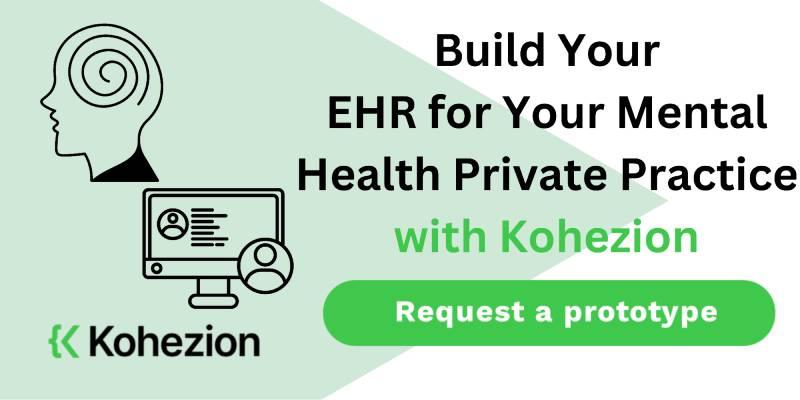According to recent research, 89% of mental health service users believe that sharing EHRs helps improve the quality of care, while 81% support using EHRs for clinical decision-making. Choosing the right mental health software helps make work smoother and improves communication with patients.
This article examines the top EHR choices for mental health practices. It provides insights into their offerings and tips to help you find the perfect software for your practice.
What is EHR for Mental Health Private Practices
An EHR for mental health private practices helps mental health experts manage their work better. Electronic health records keep patient information correct and up-to-date and reduce paper documents.
Behavioral health software offers customizable templates for mental health needs, ensuring each patient gets the care they need. Patient portals in these EHR systems make booking appointments easy and keep communication with clients secure, improving care.
Using an EHR in your practice reduces paperwork and keeps patient info safe. It meets rules like HIPAA. As mental health care changes, good electronic health records are vital for top-notch patient care.
Why is EHR for Mental Health Private Practices Important
Using an EHR system in your mental health practice ensures better patient care and makes your practice more efficient. EHRs do more than just record patient information. They let you spend more time with patients and less time on paperwork.
An EHR makes managing your mental health simplifies billing and ensures claims are correct. This makes handling money easier and keeps patient information safe. It also supports telehealth, helping patients who can't visit in person.
Also, an EHR system helps different doctors work together, leading to better treatment plans and patient outcomes. Understanding the value of EHR in mental health helps create a supportive environment for doctors and patients.
Benefits of EHR for Mental Health Private Practice
Using an electronic health record (EHR) system in your mental health practice changes everything. It makes daily tasks easier and improves patient care. This shows how important it is to use technology in healthcare.
Streamlined Practice Operations
An EHR system reduces paperwork and automates many tasks, so therapists and staff can focus more on patients and less on paperwork.
Better Patient Care
Quick access to health records is key. EHR systems let you easily check treatment histories. This helps you make better decisions and create treatment plans that meet your patients' needs.
Efficient Scheduling of Appointments
Integrated scheduling helps reduce missed appointments, and automated reminders reduce no-shows. This improves your schedule and helps your practice grow.
Simplified Billing and Claims Processes
EHR systems make billing easier, help with claims, and ensure faster payment so your practice can make more money.
Improved Communication
EHR tools ensure good communication between staff and patients. They also make sure everyone has fast access to the right information. This helps keep care up to legal and ethical standards.
Compliance With Legal and Ethical Standards
Following the law can be challenging, but an EHR helps a lot. It keeps accurate records that meet legal needs, lowering the risk of problems caused by bad records.
Less Paperwork
Switching to an EHR means less paper. This makes work more efficient, creates a cleaner space for staff and patients, and makes your practice feel more welcoming.
Data-Driven Insights
An EHR system can look at patient data to give you insights. Using these insights can improve your practice and help with patient care. It keeps you ahead in mental health care.
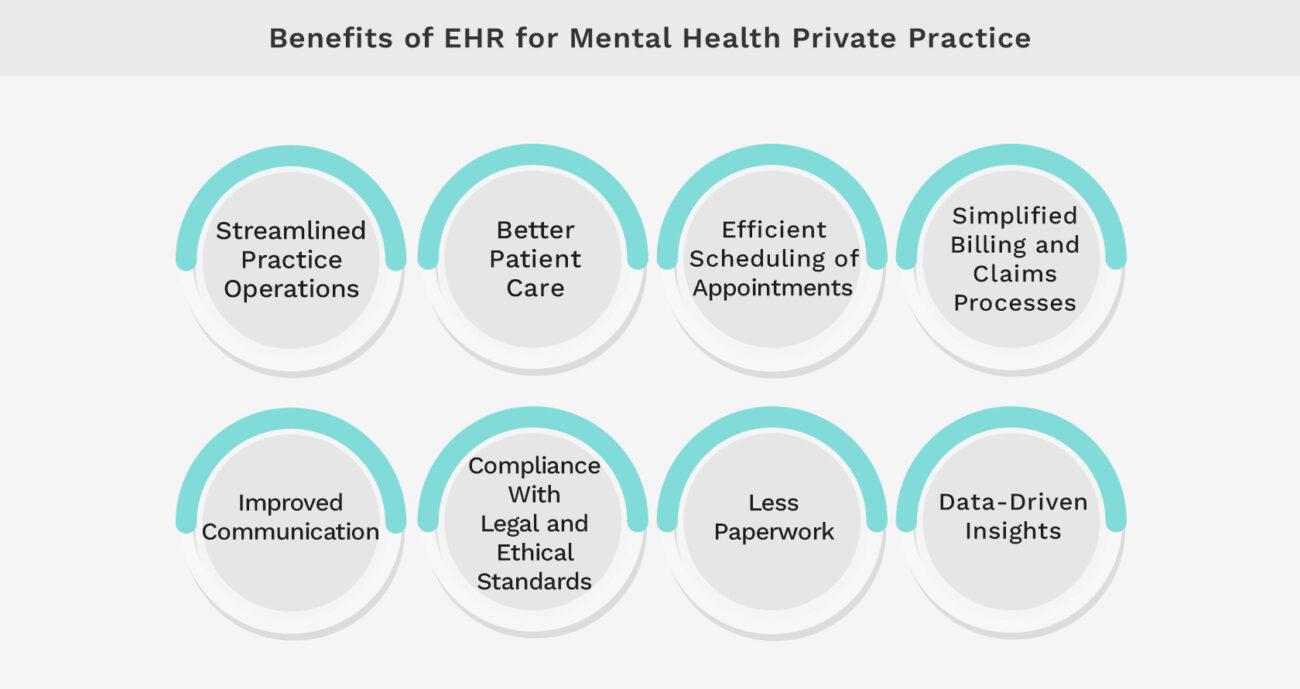
10 Best EHR for Mental Health Private Practice
Here are the 10 best EHR options for 2024, each offering features to support mental health professionals.
1. Kohezion
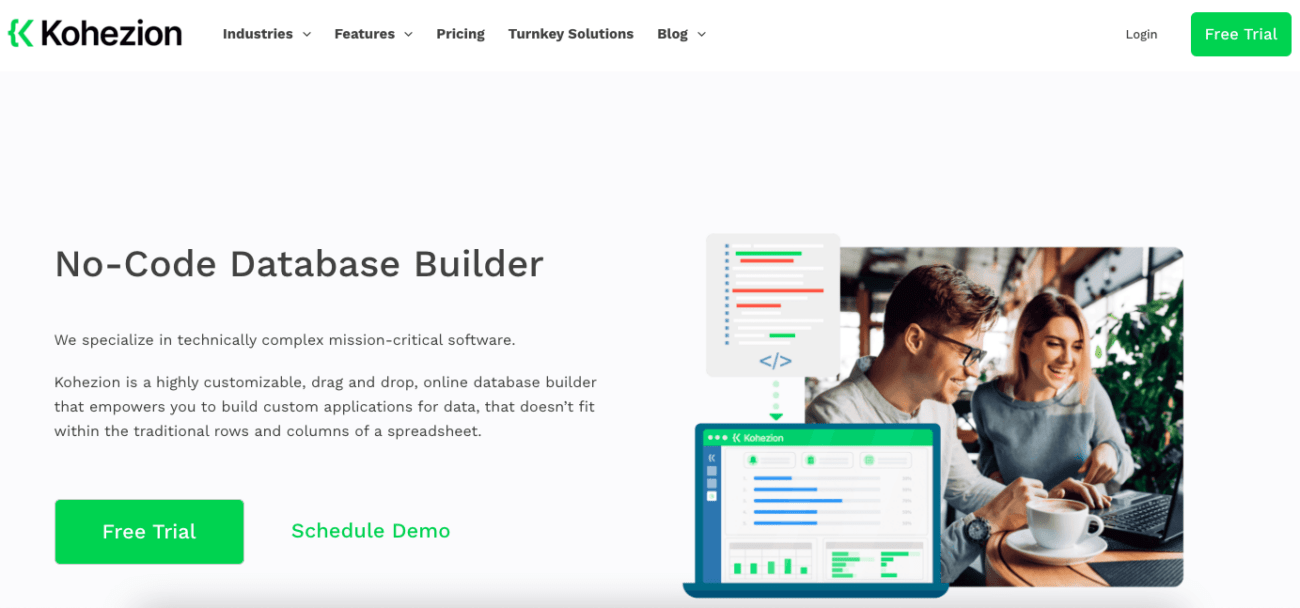
Kohezion is a customizable database application ideal for mental health practices seeking tailored solutions. It allows users to create personalized patient records, appointment management, and billing workflows. Kohezion emphasizes flexibility and scalability, making it suitable for practices of all sizes.
Top 5 Features:
- Customizable database design
- Appointment scheduling integration
- HIPAA-compliant data storage
- Built-in reporting tools
- Secure user access control
5 Benefits:
- Personalized workflows to fit practice needs
- Improved data security with HIPAA compliance
- Simplified appointment tracking and management
- Better decision-making with data insights
- Scalable as your practice grows
2 Cons:
- Requires setup time for customization
- Limited templates compared to pre-built EHRs
Best For: Practices needing high customization and data control.
2. Praxis
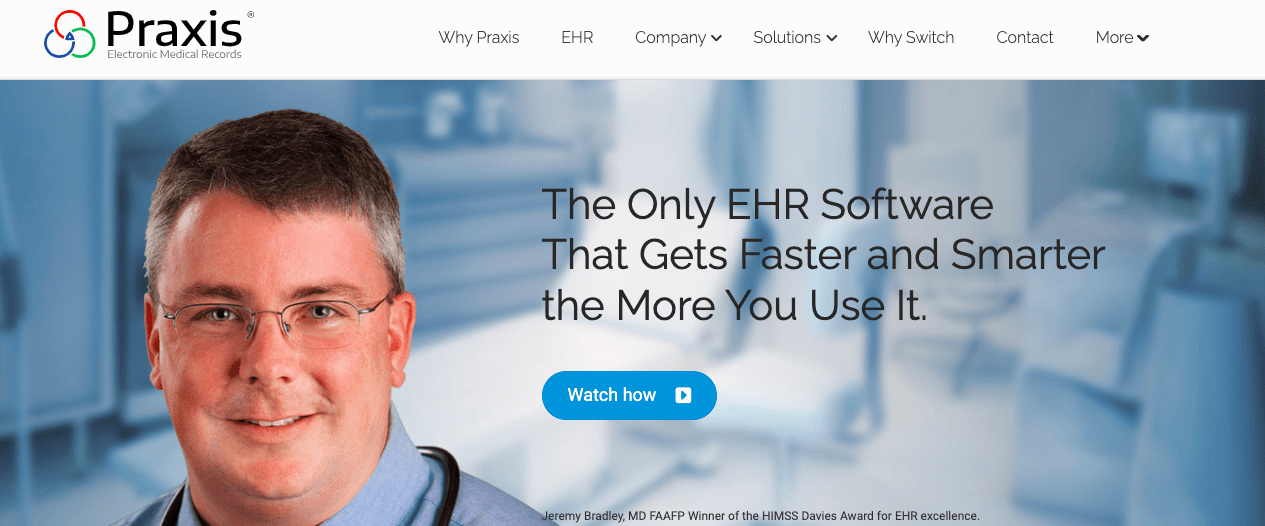
Praxis EHR is designed around its unique "Concept Processing" AI, allowing mental health professionals to create notes without templates. This learning system adapts to each user’s preferences, streamlining patient documentation. It's ideal for those who prioritize narrative documentation over standard templates.
Top 5 Features:
- AI-driven concept processing
- Template-free note creation
- Speech recognition capabilities
- Customizable workflows
- Reporting and analytics
5 Benefits:
- Faster documentation with adaptive AI
- No need for rigid templates
- Hands-free note-taking with voice features
- Personalized to fit individual clinician preferences
- Improved efficiency with automated workflows
2 Cons:
- Steeper learning curve for new users
- Limited pre-built mental health features
Best For: Clinicians preferring non-template, AI-driven documentation.
3. BreezyNotes
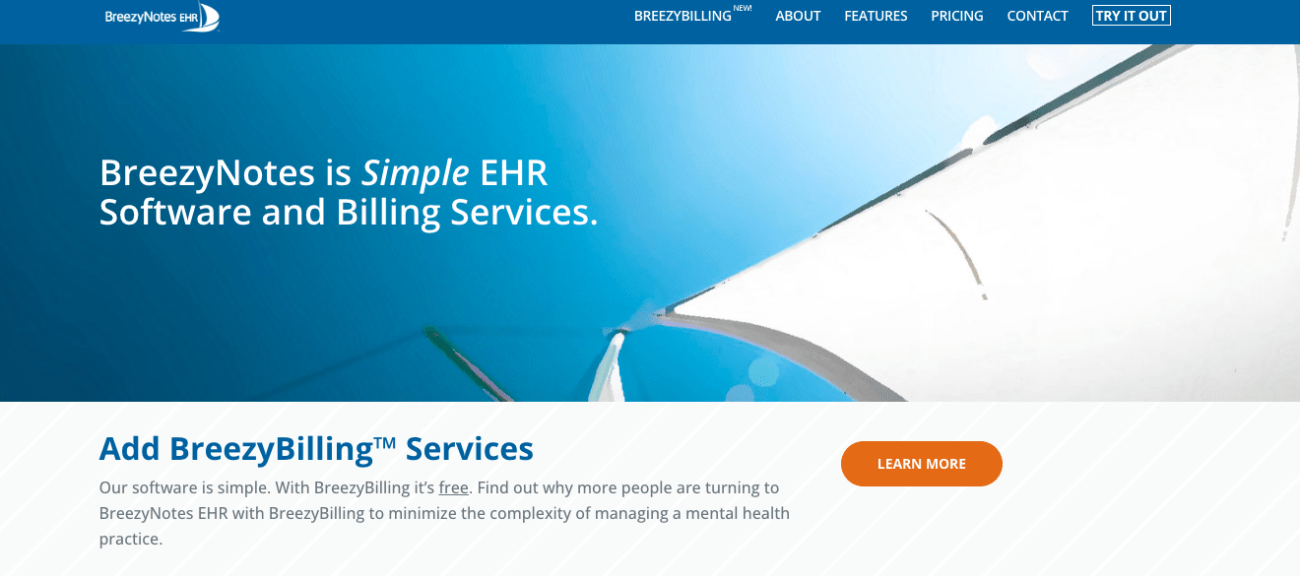
BreezyNotes is an EHR specifically designed for small and solo mental health practices. Its intuitive interface simplifies patient scheduling, billing, and documentation, aiming to keep operations smooth with minimal administrative burden.
Top 5 Features:
- Easy-to-use client portal
- Integrated billing and claims
- Appointment scheduling
- Note templates for mental health
- Secure document management
5 Benefits:
- Simplified client management with the portal
- Easier billing and insurance processes
- Reduced administrative time with streamlined scheduling
- Pre-built templates for faster note-taking
- Secure storage of client documents
2 Cons:
- Limited scalability for large practices
- Fewer customization options
Best For: Small and solo practices looking for simplicity.
4. QualiFacts InSync

InSync by QualiFacts offers a fully integrated EHR solution for mental health professionals. It supports telehealth, billing, patient records, and clinical documentation in one platform and is designed to improve patient care and operational efficiency.
Top 5 Features:
- Integrated telehealth
- Customizable treatment plans
- Billing and claims management
- HIPAA-compliant data storage
- Patient Portal
5 Benefits:
- Improved care delivery with telehealth integration
- Personalized treatment planning for each client
- Simplified billing and payment processes
- Secure data handling for compliance
- The portal increases patient engagement
2 Cons:
- Higher cost for smaller practices
- Complex setup for new users
Best For: Larger practices needing integrated telehealth and billing.
5. SmartClinix
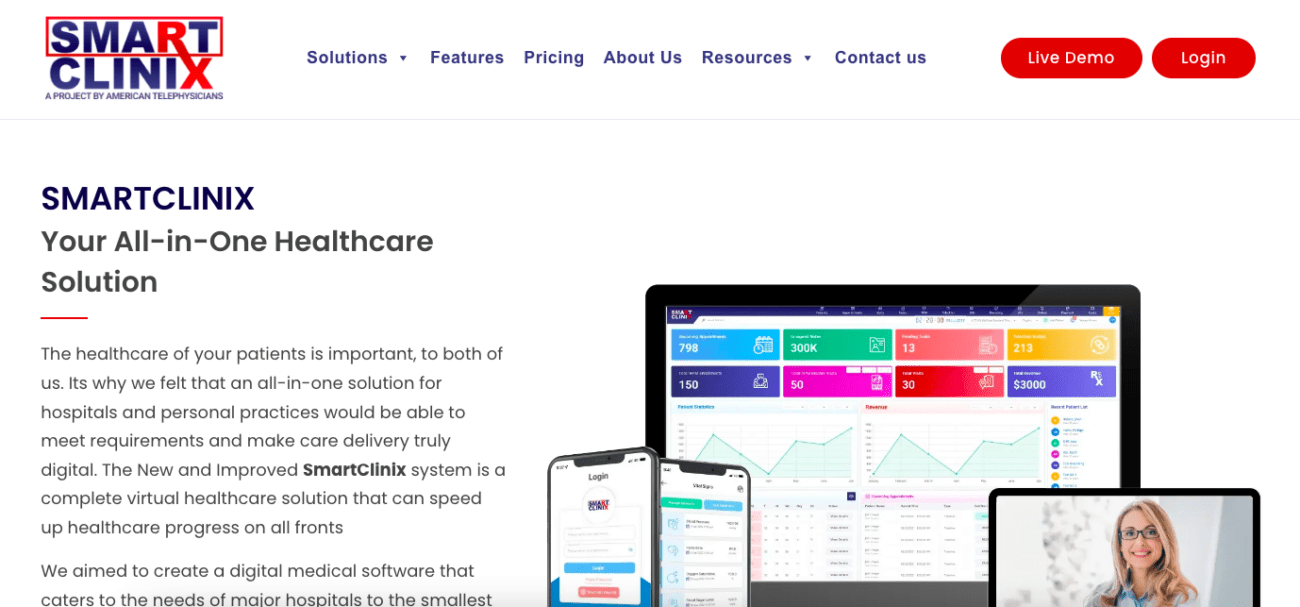
SmartClinix is a cloud-based EHR solution tailored to mental health professionals. It offers telemedicine, patient management, and billing features and is designed to streamline practice operations and improve patient outcomes.
Top 5 Features:
- Cloud-based access
- Telemedicine functionality
- Automated billing and claims
- HIPAA-compliant security
- Customizable workflows
5 Benefits:
- Access from anywhere with cloud technology
- Improved care delivery with telemedicine
- Reduced errors with automated billing
- Safe patient data with HIPAA compliance
- Workflows tailored to fit practice needs
2 Cons:
- Limited offline access
- Higher subscription costs
Best For: Practices seeking robust telemedicine and cloud-based access.
6. SimplePractice

SimplePractice is a widely used EHR for mental health, known for its ease of use and comprehensive features. It supports scheduling, telehealth, documentation, and billing, making it ideal for solo and group practices. The platform is HIPAA-compliant and offers customizable note templates.
Top 5 Features:
- Telehealth integration
- Customizable note templates
- HIPAA-compliant data storage
- Integrated billing and claims
- Client Portal
5 Benefits:
- Seamless telehealth for virtual sessions
- Faster documentation with flexible templates
- Secure handling of patient data
- Simplified billing and claims management
- The portal makes patient access easier
2 Cons:
- Higher cost for additional features
- Limited customization for larger practices
Best For: Solo and small group practices looking for an all-in-one solution.
7. CounSol.com
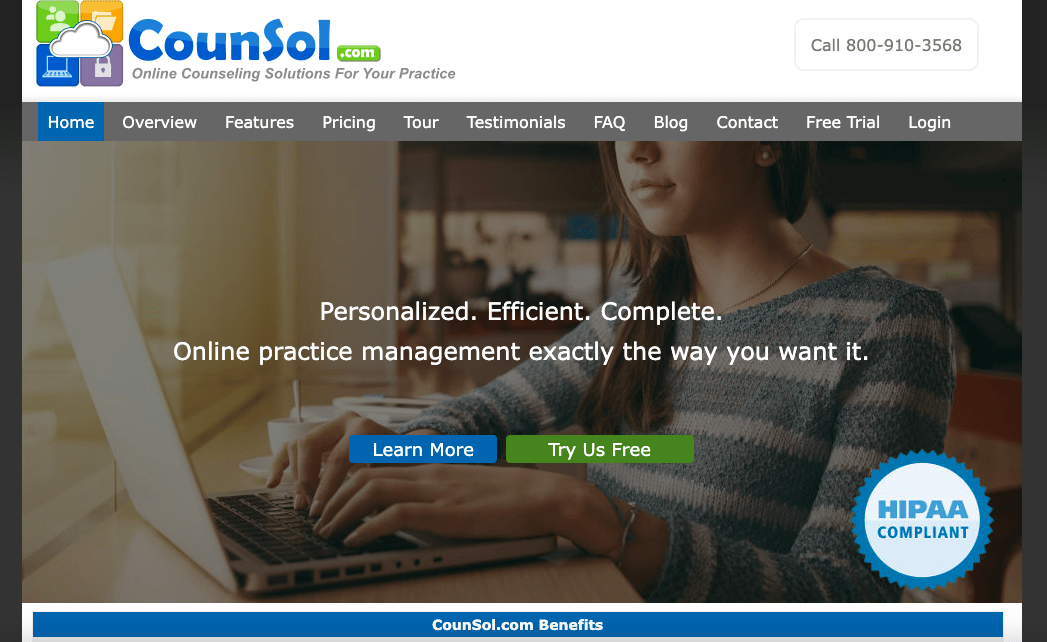
CounSol.com is an EHR designed for mental health professionals who need a simple, customizable system. It offers client scheduling, secure messaging, billing, and progress notes in an intuitive platform. CounSol.com is ideal for solo practitioners who are focused on ease of use.
Top 5 Features:
- Customizable client portal
- Secure Messaging
- Scheduling and reminders
- Progress notes and billing
- HIPAA-compliant
5 Benefits:
- Personalized client experience with a customizable portal
- Better communication with secure messaging
- Simplified scheduling and reminders for appointments
- Easy documentation with progress note templates
- Safe data storage with HIPAA compliance
2 Cons:
- Limited scalability for larger practices
- Fewer advanced features for complex needs
Best For: Solo practitioners needing a simple, customizable system.
8. SessionsHealth
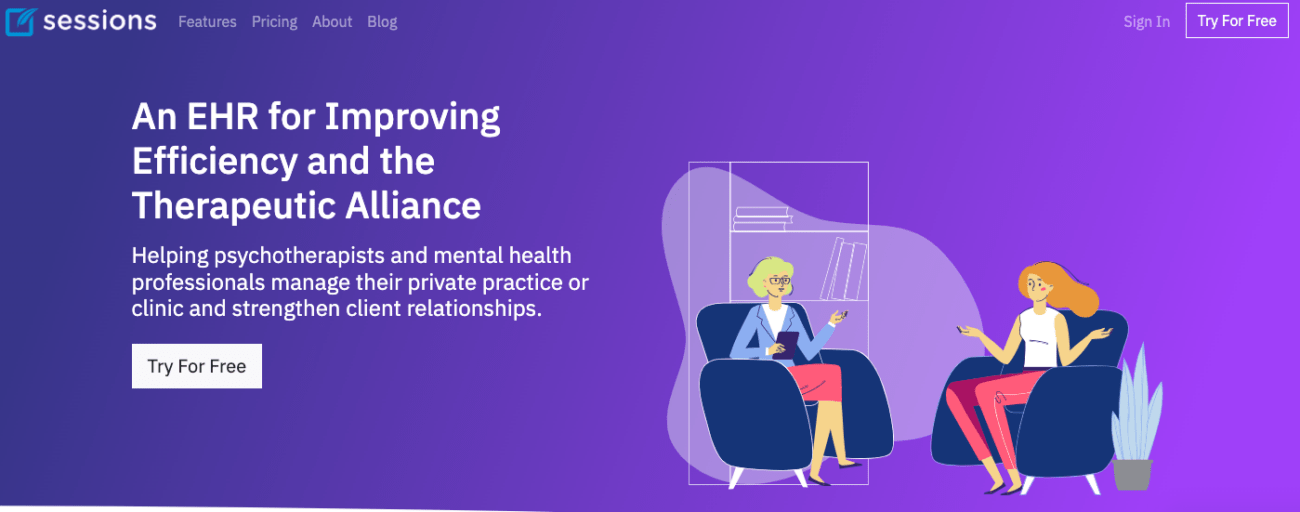
SessionsHealth is an EHR system with an intuitive design and helpful features that support mental health professionals. It includes tools for session management, telehealth, billing, and notes, making it ideal for practices looking for streamlined workflows.
Top 5 Features:
- Telehealth integration
- Session tracking and notes
- Billing and invoicing tools
- Client portal for scheduling
- HIPAA-compliant
5 Benefits:
- Better client engagement with telehealth options
- Simplified session management and tracking
- Easier billing and invoicing for services
- Clients can manage their appointments via the portal
- Secure handling of patient data
2 Cons:
- Limited customization for advanced users
- Fewer reporting options
Best For: Practices seeking user-friendly telehealth and billing features.
9. TherapyAppointment
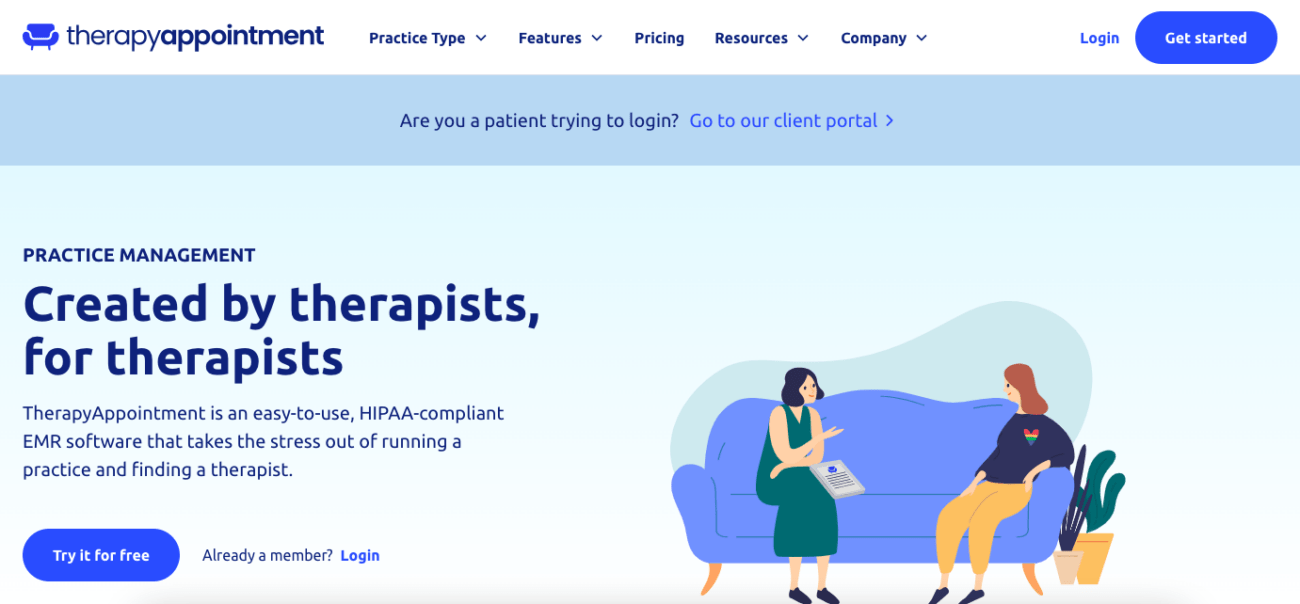
TherapyAppointment is designed specifically for mental health professionals. It offers tools to manage appointments, documentation, and billing. The platform is cloud-based and supports HIPAA compliance. It simplifies administrative tasks and helps clinicians focus on patient care.
Top 5 Features:
- Appointment scheduling
- Integrated billing and claims
- Secure client notes
- Client portal for scheduling and payments
- HIPAA-compliant data security
5 Benefits:
- Reduced paperwork with integrated scheduling
- Easier claims management with billing features
- Secure documentation for client sessions
- Clients can schedule and pay via the portal
- Compliance with industry regulations
2 Cons:
- Limited customization options
- Can be pricey for small practices
Best For: Solo practitioners and small groups needing straightforward administration tools.
10. My Best Practice
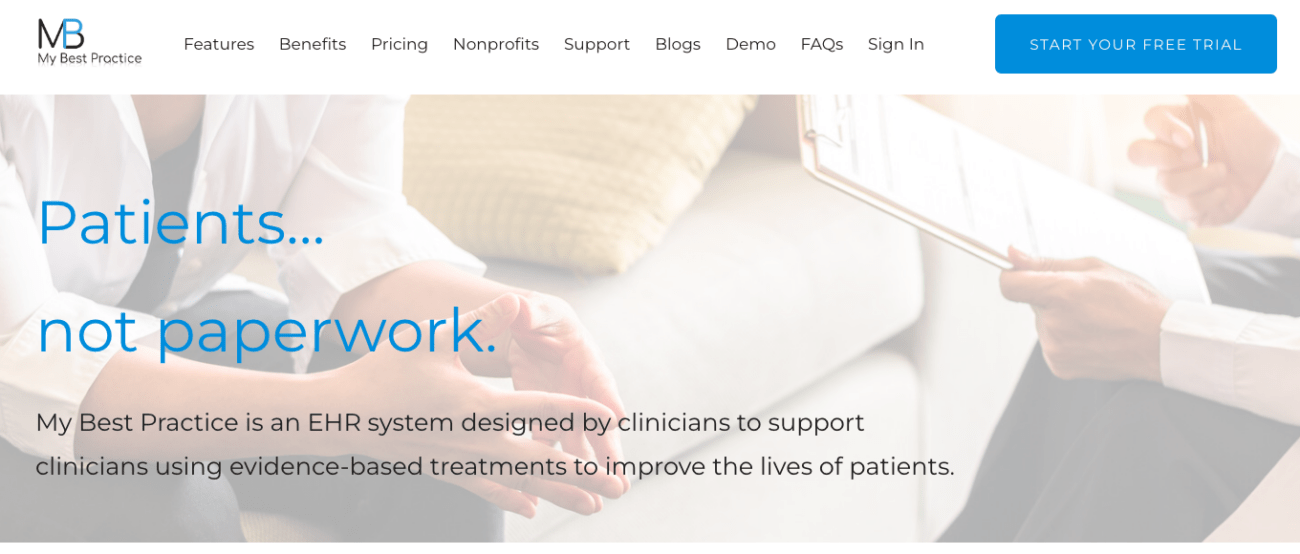
My Best Practice is an EHR platform built for mental health professionals. It offers intuitive features to manage clients, sessions, and billing. The platform simplifies the documentation and billing process, making it suitable for solo and group practices.
Top 5 Features:
- Customizable session notes
- Client management dashboard
- Billing and invoicing tools
- Appointment scheduling
- HIPAA-compliant
5 Benefits:
- Simplified note-taking with customizable templates
- Better client tracking with the management dashboard
- Easier billing and invoicing for services
- Reduced no-shows with scheduling features
- Secure data storage for compliance
2 Cons:
- Limited advanced features for large practices
- Fewer integration options with third-party apps
Best For: Mental health practices needing simple, effective client and session management.
Top Features in EHR for Mental Health Private Practice
Choosing the right EHR software for your mental health practice is key. It helps improve efficiency and patient care. Look for features that make daily tasks easier and keep you in line with the law. Here are some important EHR features to consider when picking a system for your practice.
Appointment Scheduling
Good appointment scheduling lets clients book online and receive reminders on time. This reduces missed appointments and helps you and your patients plan better. It's a must-have for managing your practice smoothly.
Customizable Counseling Documentation
Your practice might need special documentation. With customizable templates, you can make records that fit your clients' needs. This makes mental health practice tools more useful, giving detailed and relevant records.
Integrated Billing and Insurance Claims
Billing via your EHR makes insurance claims easier, reduces mistakes, and helps your cash flow. These features are key to keeping your practice running well.
Telehealth Features
Telehealth is now a must-have. It lets you see clients online, making mental health care easier to obtain. This feature helps you reach more people and meet patients' needs.
HIPAA Compliance
Following HIPAA rules is a must in mental health. A good EHR system has built-in protections for patient data, keeping your practice legal and building trust with your clients.
Software Integrations
Being able to connect with other software makes your EHR better. Choose a system that works with your current tools, such as CRM systems or scheduling apps. This makes managing patient info and your practice easier.
Collaboration Features
Collaboration tools in your EHR help your team communicate better. Sharing patient notes and treatment plans means everyone is on the same page, which makes your practice work better together.
Reporting and Analytics
Strong reporting and analytics give you insights into your practice's success, patient trends, and growth areas. This information can lead to better care and smoother operations.
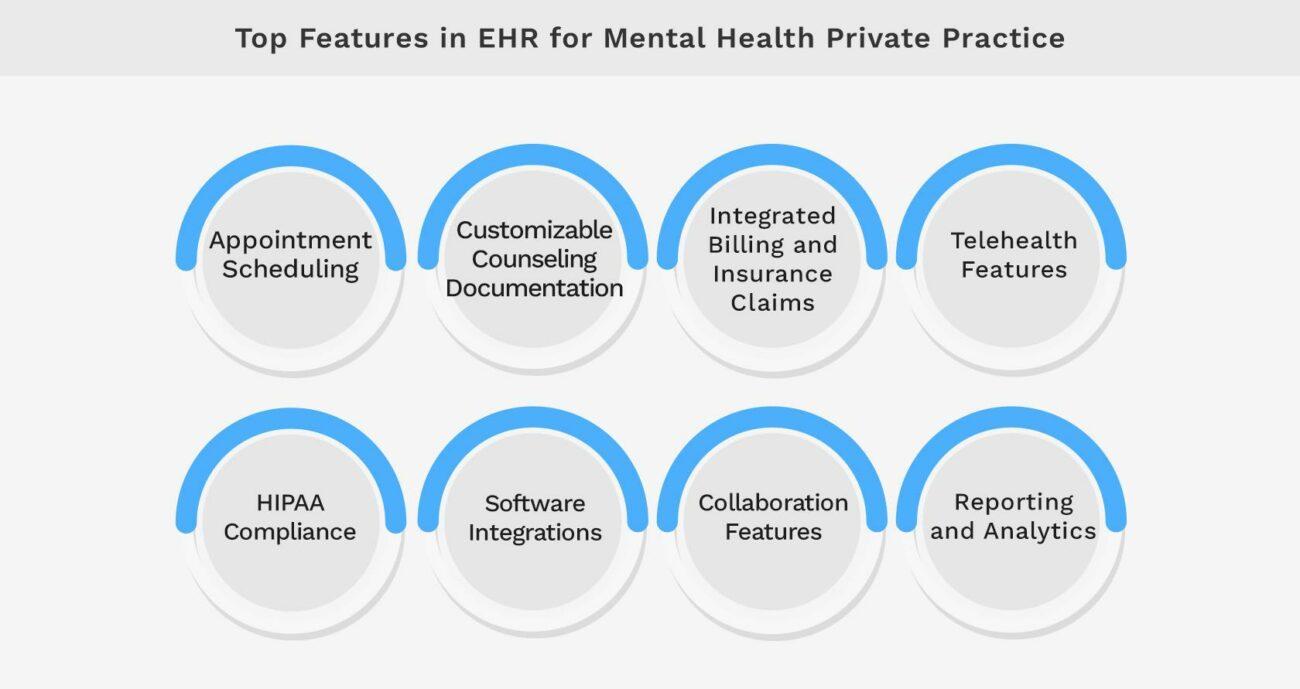
Considerations When Choosing the Best EHR for Mental Health Private Practice
When picking mental health practice software, consider the following factors:
User-Friendly
Choose EHR software that's easy for your staff to use. A system that's too complex can cause frustration. Look for interfaces that simplify daily tasks for your team.
Cost-Effective
Cost is a big part of choosing EHR software. While some features might cost more, consider what you need. Make sure the cost fits your budget without cutting out important features.
Fits Practice Requirements
Your practice's needs should guide your EHR choice. Check if the software meets your practice's legal and clinical needs. If it lacks the right features, it could make things less efficient.
Customizable
Choose an EHR system that can be customized to fit your unique workflow. A flexible system lets you set up settings and forms that work for you, making the software more usable and in accordance with your practice’s rules.
Scalable
As your practice grows, your EHR software should, too. Look for systems that can grow with you. Easily adding new features or users is key to your practice's long-term success.
Technical Support and Training Provided
Good technical support and training ensure proper usage of the EHR system. Ask about the support and training offered, including sessions for your staff. Reliable help can make starting up smoother and reduce problems later on.

Why Choose Kohezion EHR for Your Mental Health Private Practice
Kohezion is a top choice for mental health practices. It offers unique benefits that improve patient care and meet legal standards. The benefits of Kohezion go beyond just basic features. It's easy to use, even for those not familiar with technology.
Kohezion has a wide range of features made just for mental health care. You can create custom forms to get the patient information you need. The billing system is integrated, making money matters easier.
Kohezion also emphasizes keeping patient information safe and private. It also has strong reporting and teamwork tools to help you work better. Choosing Kohezion can really improve your practice and make patients happier.
Conclusion
Choosing the right EHR for your mental health practice is key to better operations and quality patient care. When looking at options in 2024, check out important features, costs, and how they fit your practice. A good EHR can change your work, simplify paperwork, and improve talking with clients.
Take your time to determine your needs and look at different EHR options. This way, you can pick one that makes your practice more efficient. The right EHR helps you in your daily work and improves the care you give your clients.
Researching and picking the best EHR can improve your practice and the care you offer. Using new technology to advance mental health care will make a big difference in how you work and the care your patients get.
If you're interested in learning more about how Kohezion can meet the EHR needs of your mental health practice, contact us today for more information or a personalized demo.
Start building with a free account
Frequently Asked Questions
The time it takes to implement an EHR system for a mental health private practice can vary. On average, it can take a few weeks to a few months, depending on the system's complexity and how much customization is needed. Simpler systems may be up and running faster, while larger setups might take longer due to training and data migration.
The cost of an EHR for a mental health private practice can vary based on the system and features. Prices generally range from $50 to $200 per month per user, depending on the complexity of the software. Some systems may charge extra for add-ons like telehealth or additional storage.
Switching EHR systems can be done, but it may require careful planning. Many EHR providers offer data migration services to help transfer patient records. To reduce the need for future system changes, choose a scalable solution that can grow with your practice.
Mental health-specific EHRs often offer features tailored to the unique needs of therapists, such as customizable therapy notes and treatment planning tools. These features can make managing patient care more efficient. While general EHRs can work, a specialized system can offer better functionality for mental health practices.

